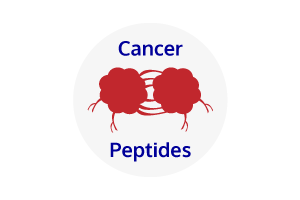posted February 3, 2023, updated February 4, 2025
February 4th marks World Cancer Day. In the United States, in 2024, it is estimated there were 2 million new cancer diagnoses and approximately 610,000 related deaths. In fact, 1 in 2 men and 1 in 3 women will be diagnosed with cancer in their lifetime and cancer is one of the top causes of death in developed countries worldwide. Screening, prevention, and treatment have improved the outcomes of some cancers. For instance, a 65% decrease in cases of HPV was seen from 2012-2019 (compared to 33% decline the previous period), likely due to vaccination.2 Early detection and treatment also can improve prognosis.
Given that peptides possess favorable attributes, such as good cell-penetration or as receptor agonists or antagonists, peptides have several uses in cancer treatment and prevention. Some of the many ways include:
- As peptide-drug conjugates, with peptides as carriers to get the drug to the appropriate target, some examples:
- radio-labelled receptor-binding peptides for detection and targeted treatment
- peptide conjugated to a cytotoxin or other compound, as “warheads” to deliver tumor-targeting compounds
- Peptides as agonists and antagonists of hormone receptors, for instance to suppress androgen expression
- As a part of vaccines for cancer prevention
- as an antigen to stimulate the production of antibodies that block tumor production pathways
- Neoantigen peptides for personalized medicine applications
- To target the pathways cancer cells use to set up vasculature or to trigger cancer cell apoptosis
Several approved peptides for cancer are agonists or antagonists of luteinizing hormone-releasing hormone or LHRH, for example leuprolide, goserelin, histrelin, and buserelin. Cancers that are a result of androgens can be treated by agonists and antagonists of LHRH which ultimately cause androgen suppression. In the case of prostate cancer, testosterone is the androgen suppressed.3 Alternatively, some peptides may act as estrogen antagonists, and may prove useful in treating hormone-receptor positive breast cancers. Somatostatin-derived peptides are also currently on the market for treating gastroenteropancreatic neuroendocrine tumors. In addition, several vaccines against various cancers are also in development containing peptides. Finally, personalized medicine applications help address care gaps by tailoring the treatment to the individual and this is often done by targeting peptide neoantigens on the surface of the cancer tumors.
AmbioPharm can support with cGMP manufacturing and supply of peptides in clinical development or approved commercial products for the treatment, prevention, and diagnosis of cancer. In addition, we can support with the synthesis of peptide conjugates that can later be radio-labelled as a radiopharmaceutical end-product. As a peptide contract development and manufacturing organization (CDMO) providing cGMP peptide APIs with capabilities ranging from research to commercial scales, AmbioPharm actively engages with innovative biopharmaceutical companies in developing first-in-class, best-in-class, and breakthrough peptide technologies that utilize AmbioPharm’s peptide manufacturing expertise and in-depth scientific experience in novel and conventional peptide chemistry.
References
- Information and Resources about Cancer: Breast, Colon, Lung, Prostate, Skin. https://www.cancer.org/
- https://acsjournals.onlinelibrary.wiley.com/doi/full/10.3322/caac.21763
- Rick FG, Schally AV. Bench-to-bedside development of agonists and antagonists of luteinizing hormone-releasing hormone for treatment of advanced prostate cancer. Urol Oncol. 2015 Jun;33(6):270-4. doi: 10.1016/j.urolonc.2014.11.006.
Related Blogs:
- Peptide-based Therapeutics for Treating Breast Cancer
- Peptide Vaccines in Canine Veterinary Medicine
Further Reading:
- https://www.worldcancerday.org/
- Ariceum Therapeutics and AmbioPharm Enter Strategic Manufacturing and Supply Partnership – AmbioPharm to provide cGMP peptide synthesis and support for clinical radiopharmaceutical manufacturing
- Latest Publication in Biomedicines – A Conjugate between Lqh-8/6, a Natural Peptide Analogue of Chlorotoxin, and Doxorubicin Efficiently Induces Glioma Cell Death
- Amytrx Therapeutics Partners With AmbioPharm to Expand the Potential of Its Breakthrough Leukocyte-Targeting Anti-Inflammatory Human Peptides – AMTX-100 has a unique specificity to target leukocytes involved in the overactive immune response and the second is its ability to cross cell membranes and enter the nucleus through natural mechanisms already utilized by cells. As such, the resulting peptide platform shows great promise in a wide range of therapeutic and delivery applications in inflammation, autoimmunity, and cancer.

 中文
中文